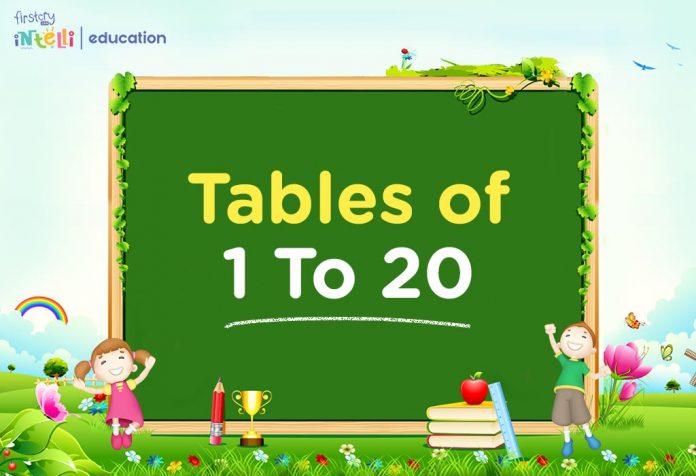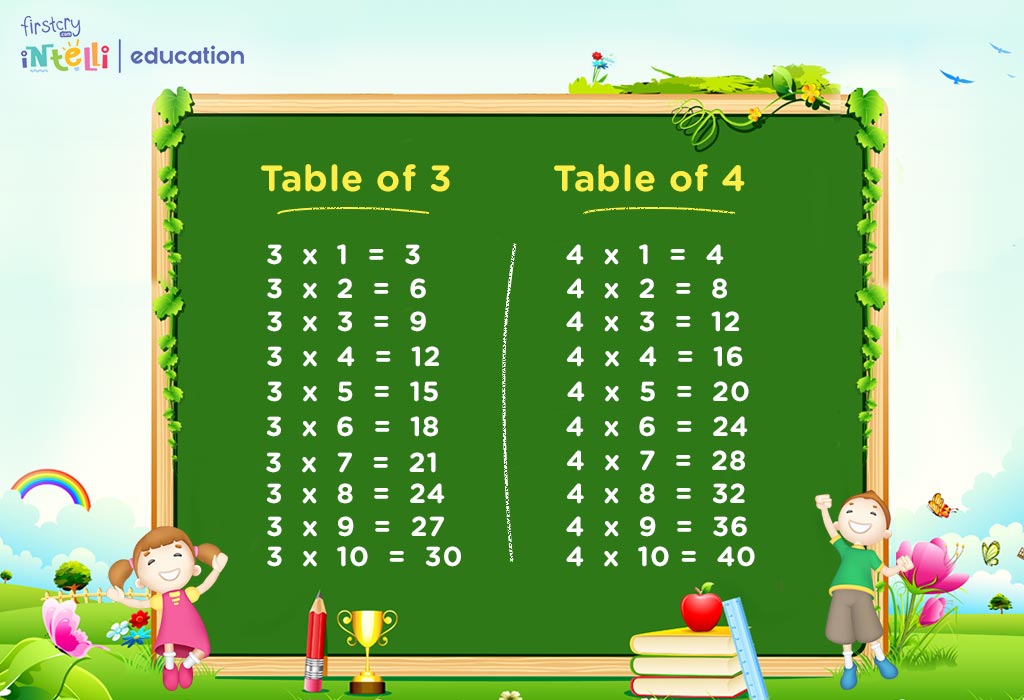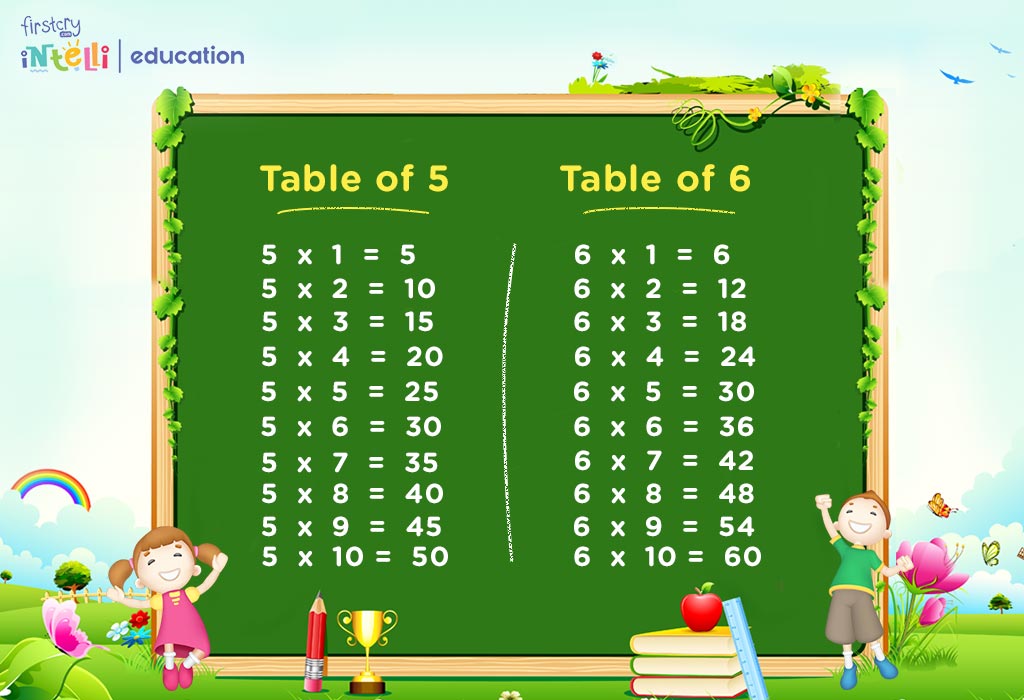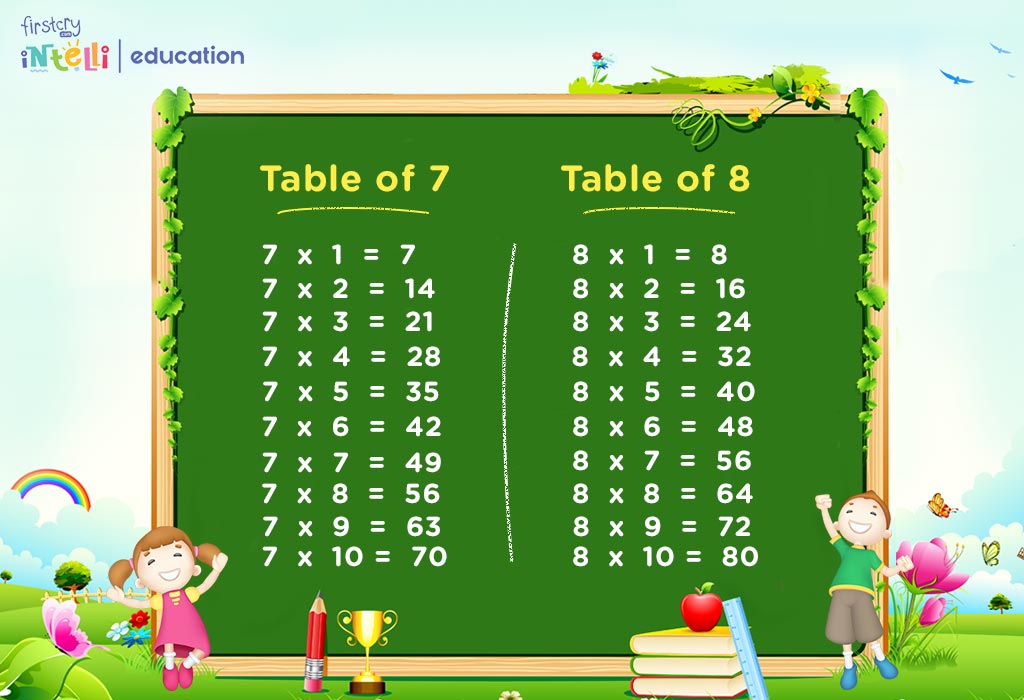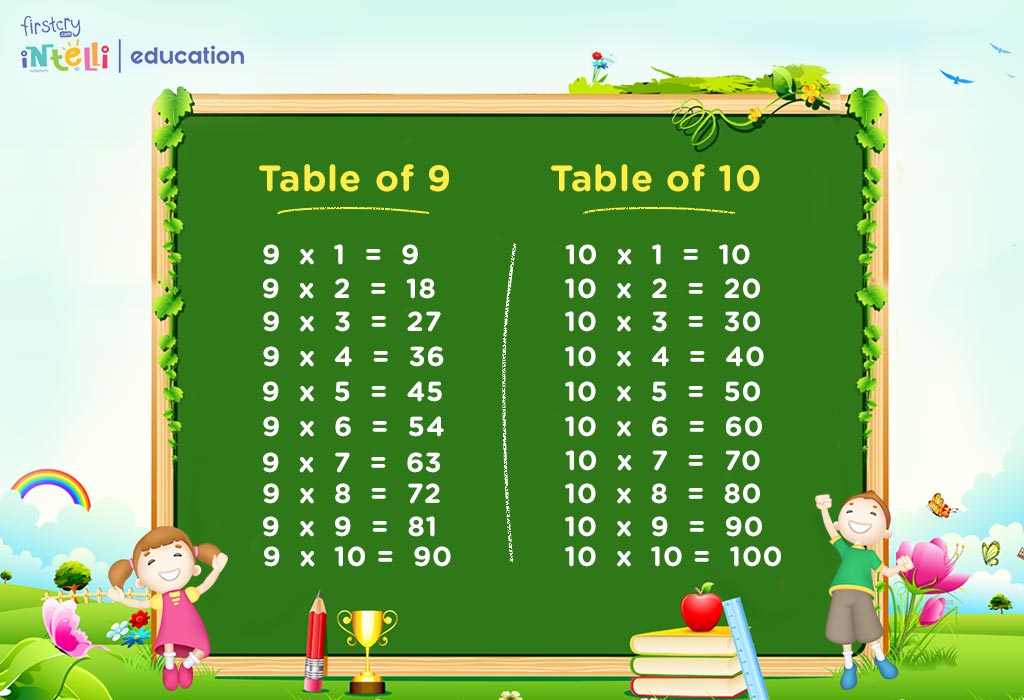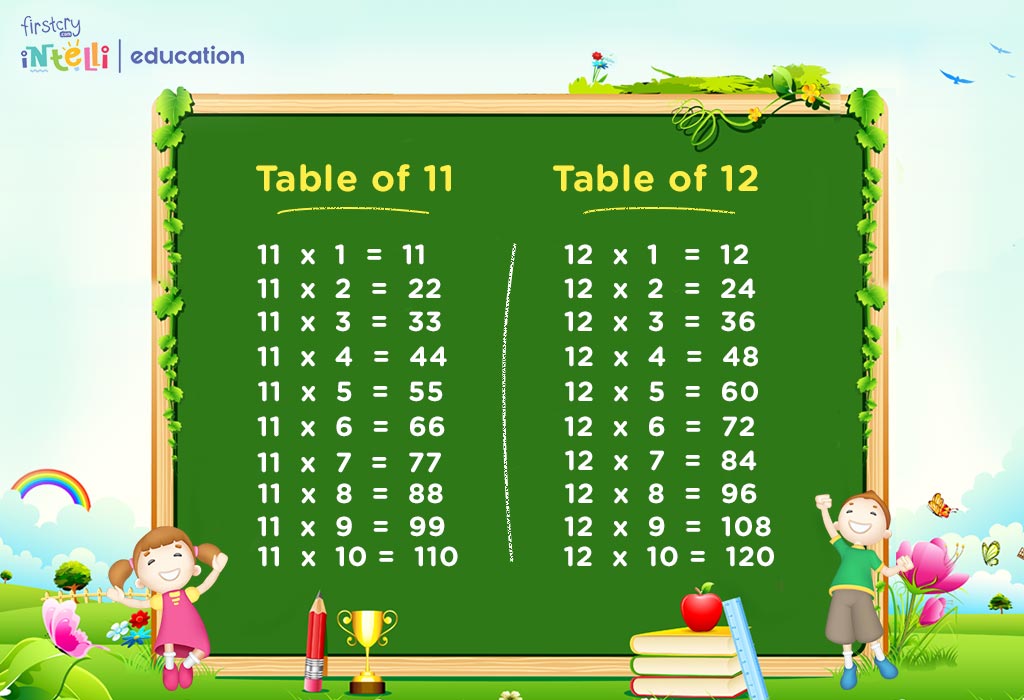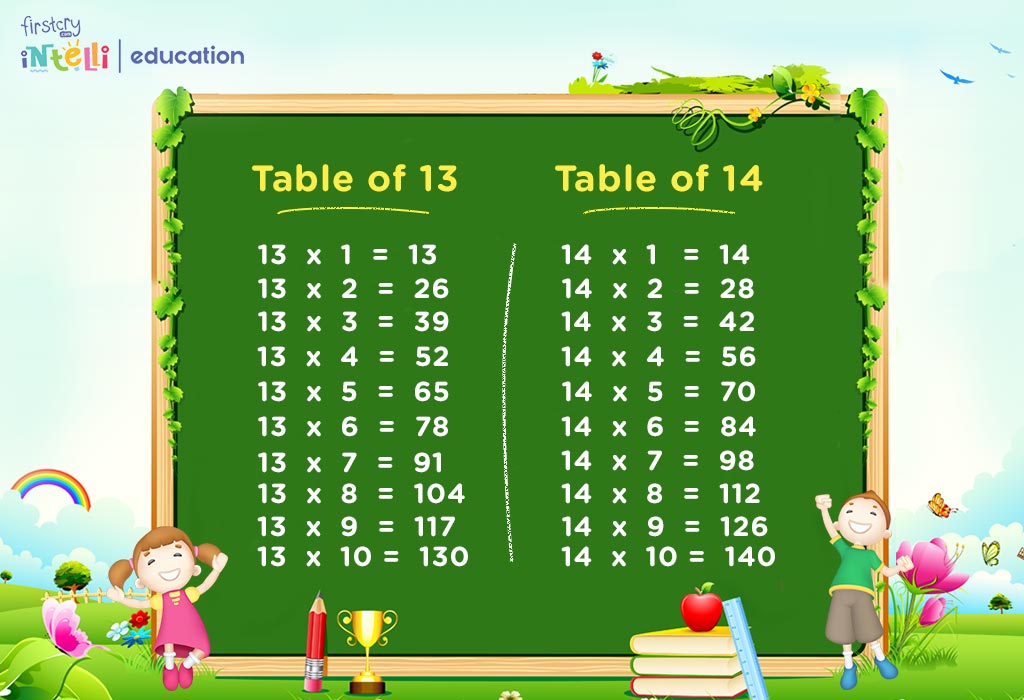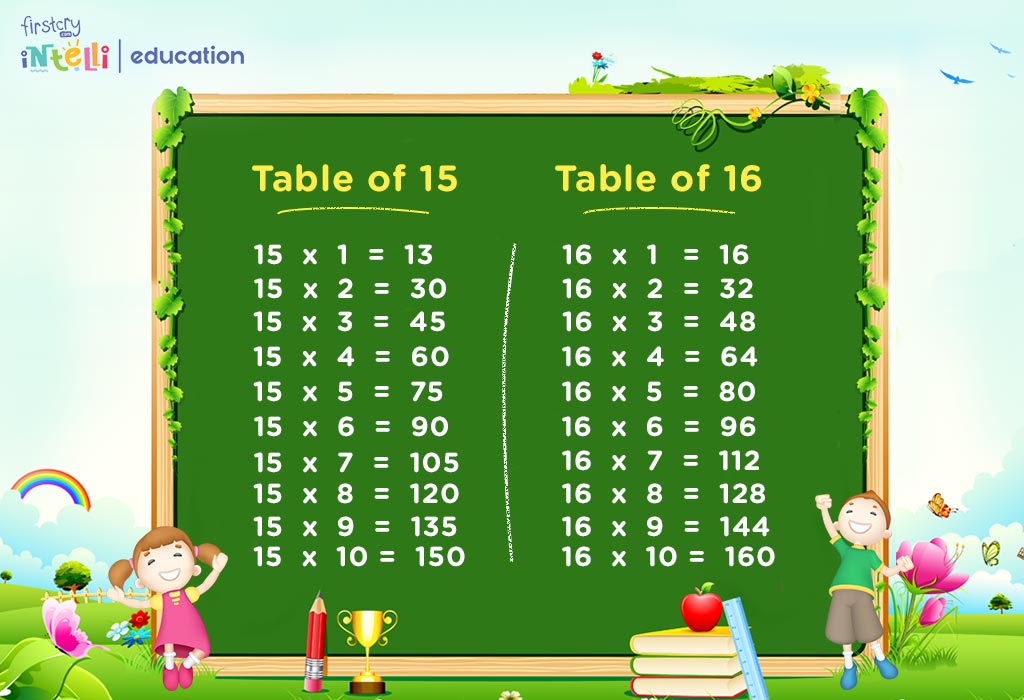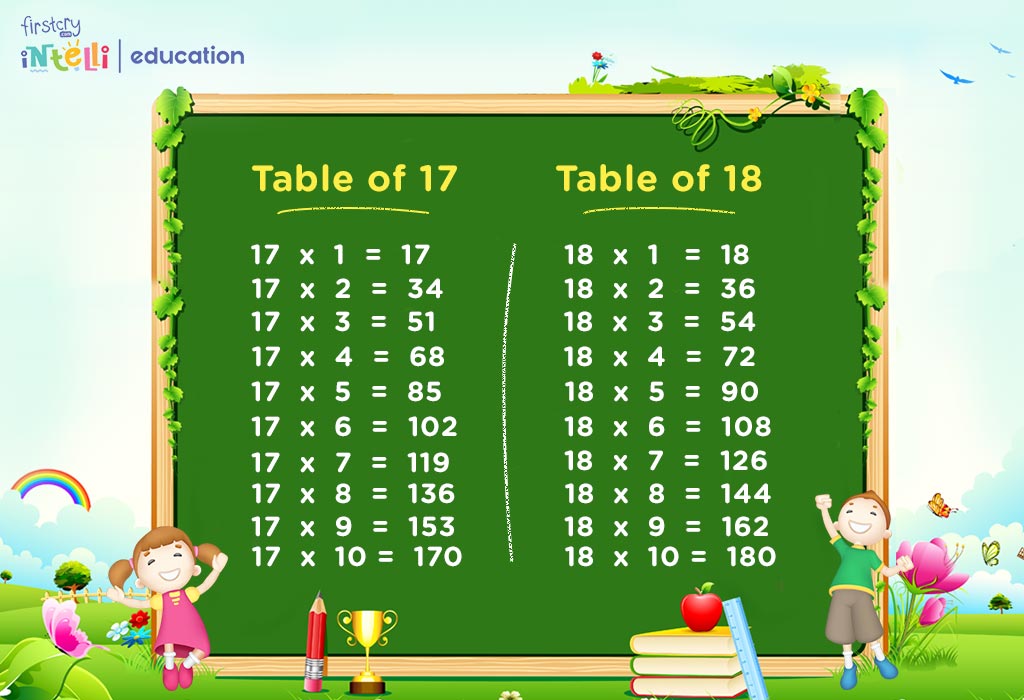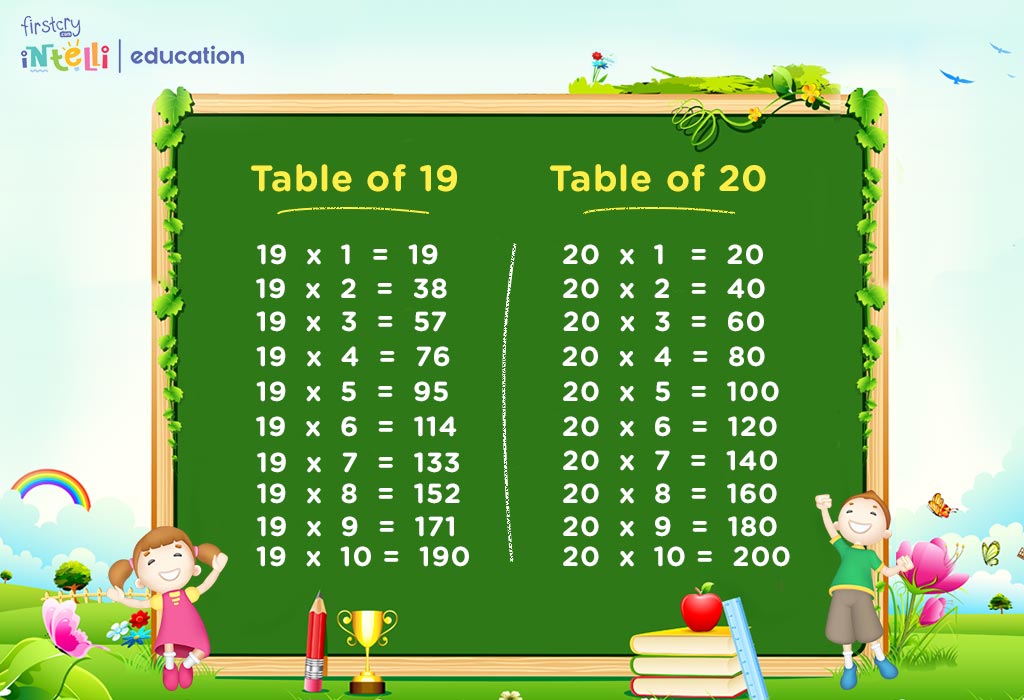When children start learning the mathematical operation of multiplication, they are required to memorise the multiplication tables to make it easier and quicker to solve problems. You can start by teaching them tables of 1 through 20. Making them learn the multiplication tables is a crucial aspect of their primary school mathematics education. While this may sound like a challenging task for your child, you can make it easier if you go step-by-step.
Begin by teaching them how to multiply single-digit values and learn their multiplication tables. Once they have memorised these, they can proceed to learn the tables of two-digit numbers. Very soon, they will have memorised all the tables of 1-20. Mastering the tables of 1 to 20 makes math problems simpler and faster for children to comprehend and solve. Let us help your child learn these tables to be able to apply it to their math problems confidently.
Thank you for reading this post, don't forget to subscribe!
Why Your Child Needs To Learn Tables From 1 To 20
It is important for children of primary classes to learn the multiplication tables. The operation of multiplication lays the foundation of mathematics, and once you grasp this concept, you can solve many kinds of math problems. Below are a few benefits of learning tables:
- Mastering the table of one number makes learning the next table simpler. It helps the child become an expert in multiplication.
- The multiplication table assists with mental math, and the child can calculate confidently without having to count on their fingers.
- Learning the tables helps children comprehend other concepts. It will reduce the challenges that the students may face while solving other math problems in higher grades.
- Tables have practical applications in daily life and boost the confidence of students.
Multiplication Tables From 1 To 20
Learning the tables is quite useful for solving mathematical problems and computations. The chart below will assist you in memorising the multiplication tables of 1 to 20.
Tables of 1 to 5
| Table of 1 | Table of 2 | Table of 3 | Table of 4 | Table of 5 |
| 1 × 1 = 1 | 2 × 1 = 2 | 3 × 1 = 3 | 4 × 1 = 4 | 5 × 1 = 5 |
| 1 × 2 = 2 | 2 × 2 = 4 | 3 × 2 = 6 | 4 × 2 = 8 | 5 × 2 = 10 |
| 1 × 3 = 3 | 2 × 3 = 6 | 3 × 3 = 9 | 4 × 3 = 12 | 5 × 3 = 15 |
| 1 × 4 = 4 | 2 × 4 = 8 | 3 × 4 = 12 | 4 × 4 = 16 | 5 × 4 = 20 |
| 1 × 5 = 5 | 2 × 5 = 10 | 3 × 5 = 15 | 4 × 5 = 20 | 5 × 5 = 25 |
| 1 × 6 = 6 | 2 × 6 = 12 | 3 × 6 = 18 | 4 × 6 = 24 | 5 × 6 = 30 |
| 1 × 7 = 7 | 2 × 7 = 14 | 3 × 7 = 21 | 4 × 7 = 28 | 5 × 7 = 35 |
| 1 × 8 = 8 | 2 × 8 = 16 | 3 × 8 = 24 | 4 × 8 = 32 | 5 × 8 = 40 |
| 1 × 9 = 9 | 2 × 9 = 18 | 3 × 9 = 27 | 4 × 9 = 36 | 5 × 9 = 45 |
| 1 × 10 = 10 | 2 × 10 = 20 | 3 × 10 = 30 | 4 × 10 = 40 | 5 × 10 = 50 |
Tables of 6 to 10
| Table of 6 | Table of 7 | Table of 8 | Table of 9 | Table of 10 |
| 6 × 1 = 6 | 7 × 1 = 7 | 8 × 1 = 8 | 9 × 1 = 9 | 10 × 1 = 10 |
| 6 × 2 = 12 | 7 × 2 = 14 | 8 × 2 = 16 | 9 × 2 = 18 | 10 × 2 = 20 |
| 6 × 3 = 18 | 7 × 3 = 21 | 8 × 3 = 24 | 9 × 3 = 27 | 10 × 3 = 30 |
| 6 × 4 = 24 | 7 × 4 = 28 | 8 × 4 = 32 | 9 × 4 = 36 | 10 × 4 = 40 |
| 6 × 5 = 30 | 7 × 5 = 35 | 8 × 5 = 40 | 9 × 5 = 45 | 10 × 5 = 50 |
| 6 × 6 = 36 | 7 × 6 = 42 | 8 × 6 = 48 | 9 × 6 = 54 | 10 × 6 = 60 |
| 6 × 7 = 42 | 7 × 7 = 49 | 8 × 7 = 56 | 9 × 7 = 63 | 10 × 7 = 70 |
| 6 × 8 = 48 | 7 × 8 = 56 | 8 × 8 = 64 | 9 × 8 = 72 | 10 × 8 = 80 |
| 6 × 9 = 54 | 7 × 9 = 63 | 8 × 9 = 72 | 9 × 9 = 81 | 10 × 9 = 90 |
| 6 × 10 = 60 | 7 × 10 = 70 | 8 × 10 = 80 | 9 × 10 = 90 | 10 × 10 = 100 |
Tables of 11 to 15
| Table of 11 | Table of 12 | Table of 13 | Table of 14 | Table of 15 |
| 11 × 1 = 11 | 12 × 1 = 12 | 13 × 1 = 13 | 14 × 1 = 14 | 15 × 1 = 15 |
| 11 × 2 = 22 | 12 × 2 = 24 | 13 × 2 = 26 | 14 × 2 = 28 | 15 × 2 = 30 |
| 11 × 3 = 33 | 12 × 3 = 36 | 13 × 3 = 39 | 14 × 3 = 42 | 15 × 3 = 45 |
| 11 × 4 = 44 | 12 × 4 = 48 | 13 × 4 = 52 | 14 × 4 = 56 | 15 × 4 = 60 |
| 11 × 5 = 55 | 12 × 5 = 60 | 13 × 5 = 65 | 14 × 5 = 70 | 15 × 5 = 75 |
| 11 × 6 = 66 | 12 × 6 = 72 | 13 × 6 = 78 | 14 × 6 = 84 | 15 × 6 = 90 |
| 11 × 7 = 77 | 12 × 7 = 84 | 13 × 7 = 91 | 14 × 7 = 98 | 15 × 7 = 105 |
| 11 × 8 = 88 | 12 × 8 = 96 | 13 × 8 = 104 | 14 × 8 = 112 | 15 × 8 = 120 |
| 11 × 9 = 99 | 12 × 9 = 108 | 13 × 9 = 117 | 14 × 9 = 126 | 15 × 9 = 135 |
| 11 × 10 = 110 | 12 × 10 = 120 | 13 × 10 = 130 | 14 × 10 = 140 | 15 × 10 = 150 |
Tables of 16 to 20
| Table of 16 | Table of 17 | Table of 18 | Table of 19 | Table of 20 |
| 16 × 1 = 16 | 17 × 1 = 17 | 18 × 1 = 18 | 19 × 1 = 19 | 20 × 1 = 20 |
| 16 × 2 = 32 | 17 × 2 = 34 | 18 × 2 = 36 | 19 × 2 = 38 | 20 × 2 = 40 |
| 16 × 3 = 48 | 17 × 3 = 51 | 18 × 3 = 54 | 19 × 3 = 57 | 20 × 3 = 60 |
| 16 × 4 = 64 | 17 × 4 = 68 | 18 × 4 = 72 | 19 × 4 = 76 | 20 × 4 = 80 |
| 16 × 5 = 80 | 17 × 5 = 85 | 18 × 5 = 90 | 19 × 5 = 95 | 20 × 5 = 100 |
| 16 × 6 = 96 | 17 × 6 = 102 | 18 × 6 = 108 | 19 × 6 = 114 | 20 × 6 = 120 |
| 16 × 7 = 112 | 17 × 7 = 119 | 18 × 7 = 126 | 19 × 7 = 133 | 20 × 7 = 140 |
| 16 × 8 = 128 | 17 × 8 = 136 | 18 × 8 = 144 | 19 × 8 = 152 | 20 × 8 = 160 |
| 16 × 9 = 144 | 17 × 9 = 153 | 18 × 9 = 162 | 19 × 9 = 171 | 20 × 9 = 180 |
| 16 × 10 = 160 | 17 × 10 = 170 | 18 × 10 = 180 | 19 × 10 = 190 | 20 × 10 = 200 |
Tables Of 1 – 20 Tables Chart For Kids
Memorising multiplication tables 1 to 20 lays a foundation for other math topics taught in primary school, such as divisions, integers, extended multiplication, and more complex equations. The multiplication chart of 1 to 20 is given below for your reference. This chart in a simple form can be printed and pasted in your child’s study room for easy reference.
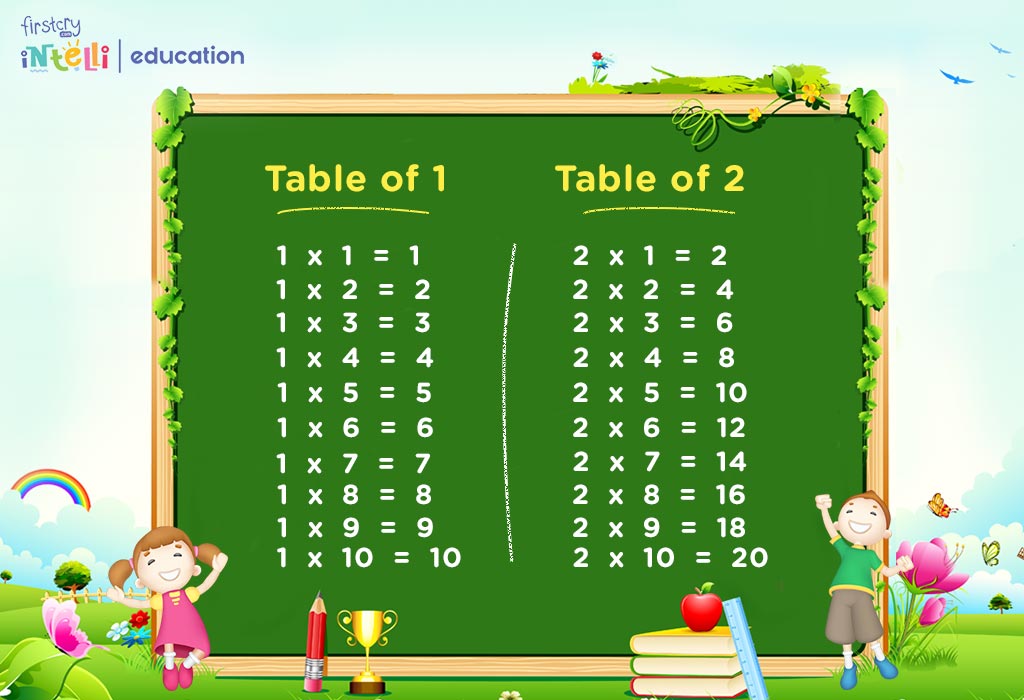
Games For Learning TheTables Of 1 To 20 For Kids
The multiplication tables are something that most children are anxious about at first. The greatest approach to teaching youngsters the multiplication table in an easy manner is to engage them in fun and practical learning tasks. Here are a few fantastic games to help you memorise the multiplication 1 to 20 table list:
1. Multiplication Flowers
This is the most entertaining method for children to learn their math tables. To begin, start drawing a circle to represent the flower’s centre. Now, in the ring, put whatever value from 1 to 9. Then, around the central circle, draw twelve petals and label them with numbers 1-12. Lastly, encircle those petals with 12 more petals around them. Ask your little one to label these with the answer they obtain as they multiply the number in the centre by the flower’s petals. This is a great way to revise tables.
2. Card Multiplication
Playing games of cards is indeed a simple technique to assist children in learning math tables. This game can be played with multiple players. Each child must draw two cards from the deck and lay them down face-up. The children then multiply those values and announce the answer. Children could even compete with opponents, flipping up their card numbers simultaneously and seeing who can respond first with the right answer or compete on who gets the highest product.
3. Paper Plate Multiplication
Here’s yet another fun and unique approach to educating children. If you do not have disposable plates, recreate this project using a circle cut out from regular paper. Inside the centre of the plate, write a number between 1 and 10 of your choice. Then, in the shape of a clock, mark twelve points on the circumference of the circular plate and label them with the numbers 1-12. Ask your child to multiply each of these numbers with the central number and note down the final answers.
4. Snakes & Ladders
Did you know that the most popular game, Snakes & Ladders, can be a great means to teach children the multiplication table! You certainly can. To begin, fill every box of the game board with different multiplication questions. Next, move your pieces to the box as per the dice roll. Once you land on a particular box, solve the multiplication problem. The one who wins can move ahead in the game. The one who can’t solve has to surrender their turn to the next player. This is a fantastic method to generate some excitement while teaching children how to apply the tables for mental math calculations.
5. Egg Carton Math
Play this entertaining activity while teaching the table of 1 to 20 to children if you have an empty egg container at home. This is among the most effective methods for teaching children the multiplication tables. Begin by writing digits 1 through 6, covering every space. Put two pebbles in the box, close it, and ask your child to shake it. This will make the pebbles fall on various spots. Now let your child open the box and check the numbers on which the pebbles have landed and multiple those two numbers. The child will earn points for each correct answer.
6. Rock, Paper, Scissors
Which kid does not want to play rock, paper, and scissors! Add a twist to the game to enable students to learn the math table, with a variation on the traditional game of rock, paper, and scissors. Rather than the three objects, children in this activity raise their fingers. For instance, two children hold up their fingers to indicate the digits 3 and 5, respectively. The one who calculates the product fastest wins the round and earns points. This exercise will assist children in learning the math table in a fun and exciting way.
Tips To Learn and Master The Multiplication Tables Of 1 To 20 For Kids
- Whenever a digit is multiplied by two in a two table, it is increased by two, twice or twofold. For instance, two times of 6 signifies the addition of 6 and 6, so the outcome is 12.
- There is a trend in the table of five. Either Zero or five is the ending digit of the product.
- You can see a trend in the table of nine. When you observe all the products on the table, you will notice that the digits in the tens place of the numerals goes in ascending order from 0 to 9 in the and digit in the unit position comes in descending order from 9 to 0. For instance, 9×1=09 and 9×10=90.
- It is relatively simple to memorise the table of 10. All you need to do is add a “0” to the value multiplied by ten, eg 10×7=70.
- Encourage students to practice writing the tables multiple times in order to observe these patterns and memorise them by heart.
- Keep asking your child to recite the tables from their memory on a regular basis.
FAQs
What Is the Simplest Way To Memorise Math Tables?
Memorising the multiplication tables of 1 to 20 is an easy way of ensuring that you remember all of these by heart. These multiplication tables are an excellent approach to educating kids on the foundations of multiplication.
You may now quickly learn the tables of 1 to 20 following some of these fun methods listed above. It becomes simple and enjoyable to tackle more questions than ever when we use the tables of 1-20 to do mental math. This knowledge will come in handy not just in the primary classes but also during higher education, competitive exams and most importantly, day to day life too!
Also Read:
Multiplication Tables from 1 To 10 for Children
Multiplication Tables from 11 To 20 for Kids
How to Learn Maths Tables from 15 to 20



